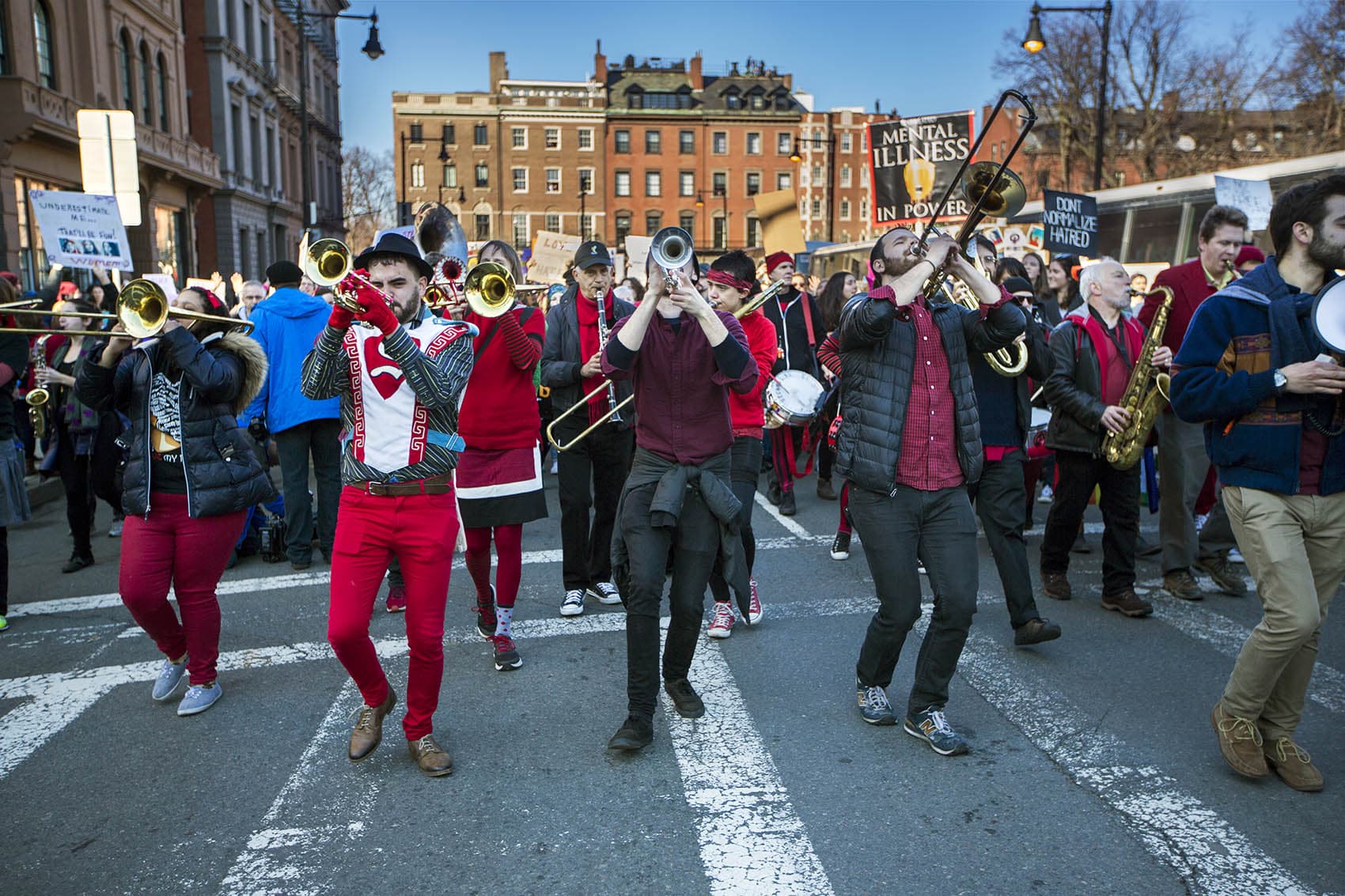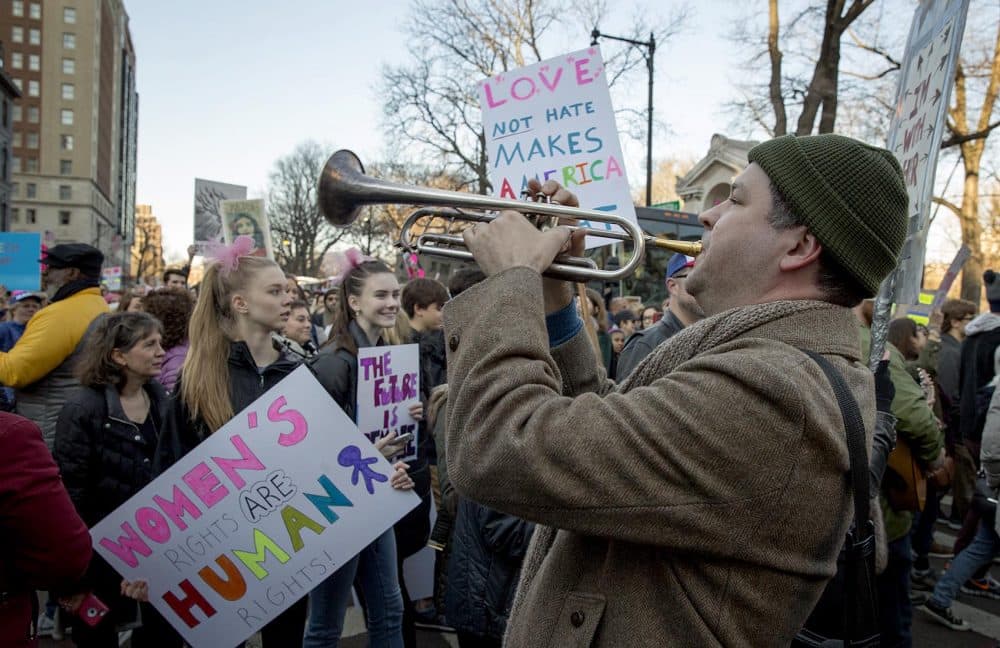Advertisement
From Flash Mobs To Janelle Monáe, Women's Marches Join A New Wave Of Protest Music

Along with the sea of pink hats that flooded the Boston Common on Saturday for the Women’s March came a deluge of something else: music.
Somerville’s Second Line Social Aid and Pleasure Society Brass Band led the way, striking up a danceable tune as the crowd spilled out of the Boston Common and onto Beacon Street. A guy with a banjo strung across his shoulders and tambourines tied to his feet wore a sign that read “This banjo kills fascists.” Children sang “We Shall Overcome” as they waited for the march to begin. A man stood at the entrance to the Public Garden warbling “Yankee Doodle” on a tin whistle.
Protest music, suddenly, seemed relevant once again — though its resurgence had already become palpable in the past year. In a December article in Billboard, the music critic and author Dorian Lynskey observed that 2016 was a banner year for popular protest music. Though his was a muted celebration, the trend he outlined was clear: From Kendrick Lamar to Solange to A Tribe Called Quest, pop music in recent years has increasingly touted the social justice causes of the day, like police brutality, systemic racism and women’s rights.
As the Trump campaign gained momentum in 2016, popular musicians, from the rapper YG to Death Cab for Cutie, inundated the internet with anti-Trump ballads; “f--- Donald Trump” became the rallying cry. The massive Women’s Marches that took place on Saturday in Washington, D.C., and in cities around the globe were a culmination of that sentiment, and megawatt pop stars like Madonna and Alicia Keys were there to show their support.
But when critics take note of the politicization of popular music, they risk overlooking a very vibrant element of the protest genre — the music that actually occurs in the streets at protests. The song that went viral online over the weekend was not the revamped version of “Girl on Fire” that Alicia Keys sang at the D.C. Women’s March but a song penned by an unsigned Los Angeles pop singer and performed, a cappella, in the middle of the rally.
"I've seen the power of song,” Anne Feeney, a Pittsburgh-based activist and folksinger, told me recently. “I've written songs for occasions and watched people's eyes light up, I've watched them start singing along. And there's something about protest songs that does things that nothing else can do. No talking head can make you walk out of a church toward the Edmund Pettus [Bridge] with tear gas and billy clubs and attack dogs and fire hoses coming at you, if you haven't been singing your heart out. And that's what gave people the strength to stick together and change the world.”
Though the protests on Saturday were not met with police violence like that encountered by civil rights protesters in the '60s, Feeney’s point still stands. There is a transcendent kind of utility to the songs that are actually sung at protests, whatever they happen to be.

Music abounded at the Boston Women’s March on Saturday, but if I had to pick a winner, it would be Woody Guthrie’s “This Land Is Your Land.” I heard it blasted by a brass band as they paraded down Beacon, and sung lustily from a balcony on Charles. I heard it on the MBTA on the way to the march, rippling from the far end of the car down the ranks of protesters packed shoulder to shoulder, patiently awaiting their release onto the streets.
Feeney says that the best protest songs are singable, and “This Land Is Your Land” surely is. As a friend of mine pointed out, it also happens to be a piece of music that everyone learned in elementary school.
“This Land Is Your Land” may be unique in this respect: a song originally penned by an activist folksinger in response to Irving Berlin’s “God Bless America” and whose lyrics are, with the exception of a few lesser-known lines, deceptively apolitical. To see the song reclaimed as a missive of dissent is to comprehend the radical potential of its message of inclusiveness.
It would be folly to understate the presence of activist brass bands, like Second Line, at the march as well. (I counted at least two others, Dirty Water Brass Band and the Boston Area Brigade of Activist Musicians.) The advent of Somerville’s Honk! Festival of Activist Street Bands in 2006 propelled a swelling in the ranks of brass marching bands and festivals around the globe — though in recent years, the original activist message of Honk! has receded, replaced by a community-oriented ethos.
On Saturday, Honk-style brass bands were a vital element of protest. They led the march and entertained the thousands of protesters who waited hours to make their way out of the Common and onto the street. They kept the crowd uplifted and focused, buoying spirits wherever they went.
That’s not to say that pop music was absent from the proceedings in Boston and elsewhere. I saw a group of children poke their heads out the windows of a parked school bus in order to lead the crowd in a chant of "Who run the world? Girls!" — the refrain to Beyoncé’s 2011 hit “Run the World (Girls).” (The moment echoed an incident in Cleveland in 2015 when Black Lives Matter protesters erupted in an impromptu rendition of Kendrick Lamar’s “Alright.”)
Numerous pop artists, from Madonna to Dirty Projectors, made appearances at the D.C. march and other anti-inauguration events. Janelle Monáe may have had the most success with her song “Hell You Talmbout,” which she released in 2015 in support of the Black Lives Matter movement and sang onstage at the D.C. Women’s March. The song, which features a simple refrain and an accessible call-and-response format, was clearly written with protest in mind, and it was easy for the crowd to join in.
For every “Hell You Talmbout” or “This Land Is Your Land,” there are a hundred lesser-known protest songs, some humble, some great. Activists often write them for specific actions and spread them on social media in advance of the events.
The Boston band Melodeego, for instance, penned the dramatic dirge “Digging Us a Hole” for a Keystone XL Pipeline protest in 2013; a song by The Peace Poets called “Voice of my Great Granddaughter," which was sung at the 2014 climate change protest #FloodWallStreet, has cropped up at subsequent climate justice actions.
Skim the videos of the recent Dakota Access Pipeline protests, and you’ll notice an intermittent soundtrack of drumming and singing. In one video, water protectors sing the “AIM Song,” an intertribal anthem popularized by the American Indian Movement in the 1970s.
The song that is currently being touted in the media as the anthem of the Women’s March is “Quiet,” which was written by the Los Angeles indie-pop singer MILCK and performed by a group of singers at the Women’s March in D.C. on Saturday. “Quiet” was not composed for the protest, but its refrain, “I can’t keep quiet,” was easily repurposed as a rallying cry — and a hashtag.
MILCK and her internet-recruited backup singers rehearsed over Skype in the days leading up to the march. The a cappella arrangement, captured on a Facebook video that has so far garnered upwards of 10 million views, features beatboxing and a melody that would sound at home in a Kelly Clarkson song.
With a catchy hook, roots in a cappella and a mode of mass dissemination clearly indebted to YouTube’s viral flash mob videos, “Quiet” may indeed be the protest song of our time. (Its protest-driven exposure also comes on the heels of the Jan. 16 release of MILCK’s official music video for the song.) For many millennials, a cappella arrangements of pop tunes, not church music or labor songs, are the most accessible form of communal singing.
Will this era produce another “This Land Is Your Land”? Will “Quiet” be the song that schoolchildren are taught in choir class for decades to come? It’s hard to say.
“I don't think a movement will succeed without art, without music,” Feeney says. “It's the life's blood of any movement.”
One thing, at least, is clear: Whenever people march, they find something to sing.
